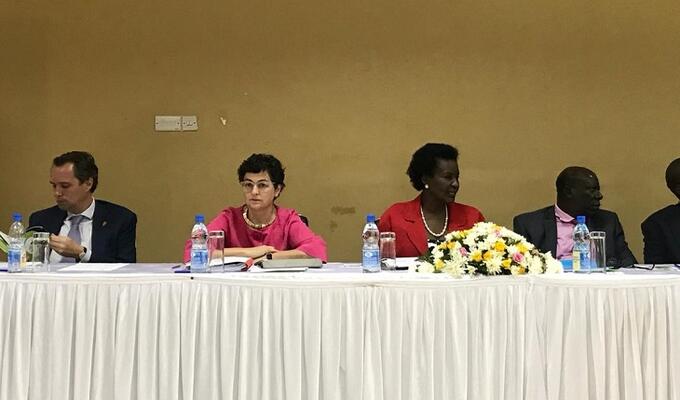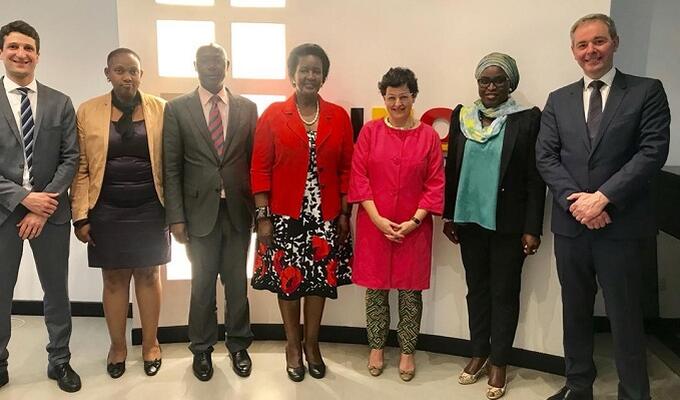

Address by ITC Executive Director at the official launch of the Netherlands Trust Fund IV project connecting Uganda SMEs and start-ups to markets
30 April 2018
Kampala, Uganda
Your Excellency, Amelia Kyambadde, Minister of Trade, Industry and Cooperatives,
Your Excellency, Frank Tumwebaze, Minister of ICT and National Guidance,
It is my great pleasure to be here today and I deeply thank my friend, Minister Amelia Kyambadde and all her team for organizing this important event.
A few weeks ago, I attended the launch of the historic African Continental Free Trade Area. In Kigali, I witnessed the strong commitment from governments across the continent to strengthen integration among their economies, to promote diversification and value-addition, and to increase the competitiveness of their domestic private sectors. They recognised that trade and trade agreements are not ends in themselves. This newborn AfCFTA is rather a means to kickstart a new economic era that puts trade at the heart of the continent’s structural transformation to produce high-skilled and better-paid jobs, and drive sustainable growth and inclusive prosperity.
Uganda is working to make the most of these opportunities. Earlier today, I met with Ugandan tech companies that had connected to international markets through an ITC project. The stories are inspiring. 3D Services Ltd now provides its logistics tracking services to a big client in France. Clinic Master International that offers health information management and medical billing systems to over 90 hospitals and clinics in Kenya, South Sudan and Uganda. Hostalite Ltd has been able to cooperate with an Indian firm to deliver training sessions on web development for example.
Yet as we know, the road ahead of us is long, both here in Uganda and in the rest of the world. Inclusive trade will be essential to achieve the international community’s Sustainable Development Goals for eliminating poverty and reducing inequality. Creating a truly inclusive world economy – one in which no countries or communities are left to languish on the margins of the global marketplace, one in which our modes of production and consumption are more sustainable – requires an ecosystem of supportive policies, rules, and institutions from the local to the multilateral level. Uganda recognizes this. The bold 2040 Vision aims to capitalize on this country’s strategic location at the centre of Africa to make Uganda a regional hub for production, trade, and transport.
ITC is honoured to be a longstanding partner of Uganda, and looks forward to accompanying it on the path towards the 2040 Vision.
I want to focus my remarks today on three ways ITC and Uganda are deepening their cooperation in pursuit of greater business competitiveness and inclusive and sustainable economic growth.
First, a better understanding of trade obstacles and greater access to trade intelligence.
Non-tariff measures (NTMs) are a major impediment to accessing foreign markets. In Least Developed Countries lost trading opportunities due to NTMs cost an estimated 15% of exports, worth a total of $23 billion a year.
Understanding these NTMs is a prerequisite for formulating effective trade facilitation policies. That is why, together with the Ministry of Trade and with the support of UK Department for International Development, ITC has surveyed 500 companies to assess their experiences with NTMs. The results, just shared with you, sought to shed light on the obstacles to Ugandan trade that come from outside the country, but perhaps even more importantly, to identify the trade barriers that exist – and are solvable - entirely within its own borders.
So, what did we learn? The NTM measures found most burdensome by Ugandan businesses are associated with compliance with foreign regulations, product quality certification and procedural obstacles at home. This includes delays, high fees and charges, and limited or inappropriate facilities in relation to testing and certification requirements.
Reducing or eliminating these non-tariff obstacles, and the resulting costs, would be transformative for the trade competitiveness of Ugandan companies, bolstering export potential while lowering prices for consumers at home.
Concrete action to strengthen the domestic quality infrastructure, facilitate compliance with technical regulations and standards, harmonise national standards to regional and international ones, and automate customs and clearance would help equip Ugandan MSMEs to compete, connect and change for sustainable and inclusive growth.
To respond the NTM-related priorities identified by the survey, the European Union, the East African Community and ITC will soon be launching a $20 million regional initiative “Market Access Upgrade Project” (MARKUP) designed to address market access constraints and supply side weaknesses. It will help Uganda increase transparency on trade procedures and policy advocacy, better foster compliance with quality and standards, improved access to finance and the strengthening of trade and investment institutions such as Uganda Export Promotion Board (UEPB).
Talking about transparency, Uganda is showing leadership on the use of market intelligence to help smaller businesses meet foreign SPS and TBT requirements. I want to congratulate Uganda for being the first user and most active disseminator of ePing, a recent alert system developed by ITC in partnership with UNDESA and the World Trade Organization. The ePing system provides real-time information on WTO members’ SPS and TBT notifications, enabling businesses to understand and adapt to changing market requirements.
This brings me to my second point about cooperation between ITC and Uganda. We are working together to strengthen the competitiveness of high-value export sectors to drive the country’s economic transformation.
Competitiveness is not an option. It is a necessity if countries are to seize the opportunities presented by trade and new technologies. But value-addition is at least as important for creating a diversified array of better-paying jobs. And if, when I say value addition, you are only picturing factories, think again: value addition needs to happen across the board, in agriculture, manufacturing, and services.
I am happy to be able to report concrete results in terms of fostering value addition and competitiveness. Through our Supporting Indian Trade and Investment for Africa (SITA) Project, which is funded by the United Kingdom, Ugandan MSMEs succeeded increased exports in sectors ranging from leather, sunflower oil, and coffee to textiles, clothing and IT services like business process outsourcing. Uganda has also attracted investments such as the first footwear manufacturing plant in Uganda, which will produce 3,000 pairs of shoes per day and employ 1,500 young people. I look forward to be back in the autumn for the official opening of the plant.
As I had the opportunity to see firsthand earlier today, Uganda’s strong emphasis on technology and the digital economy is starting to pay dividends. With global trade in IT services growing at an annual rate of 17%, and e-commerce already accounting for 12% of global trade, the sector offers great promise in terms of export revenues and opportunities for employment and entrepreneurship. The launch of the Netherlands Trust Fund IV project - and here I expressly thank the Netherlands for their support and generosity - will build on the successful achievements of the NTF III project and open up a new chapter in ITC’s support to developing exports of “Made in Uganda” IT and IT- Enabled services.
The companies I met today have used exports to increase their revenue by almost a quarter, while generating a 10% increase in employment. The NTF IV project is designed to scale up these successes to cover a wider range of businesses across sector, provide more end-to-end solutions, engage more start-ups, and ultimately be one of the key drivers of the development of Uganda’s IT sector. We expect to see more employment creation with higher salaries, opportunities for young people to create their own start-ups to unleash their entrepreneurial skills, and increased competitiveness in several sectors.
My third and final point will be about how ITC and Uganda are cooperating to promote inclusive trade that empowers society’s most vulnerable.
It is true that over the past few decades, the world has taken unprecedented strides towards greater prosperity. But too many places, and groups within countries, have not shared fully in this growth. Women and young people are too frequently locked out of full participation in labour markets due to a combination of legal, regulatory, and social obstacles. For ITC, empowering women and youth is a way to ensure no one is left behind. We cannot achieve the United Nations Sustainable Development Goals if we leave women and youth behind.
The NTF IV project will consolidate our work on women’s economic empowerment. And very soon, we will launch SheTrades Uganda with a specific focus on the IT and ITES sector. Allow me to use this moment to salute your Minister, who was one of our very first Shetrades champions and a driving force behind Uganda’s early endorsement of the WTO Buenos Aires Declaration on Women and Trade.
Let me conclude by expressing my sincere thanks to the Government of Uganda, the national authorities, the private sector representatives, and all our local partners for their commitment and partnership throughout this journey.
I am already looking forward to being back in Uganda in September for the official inauguration of the shoe factory, the launch of SheTrades Uganda and most importantly, to witness the first results of the NTF IV – Uganda.
Thank you! Asante sana!



